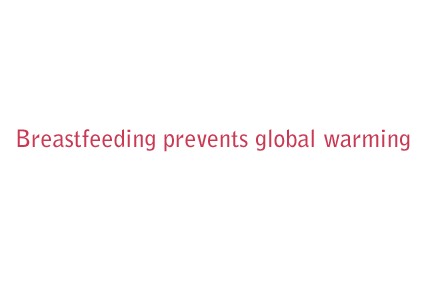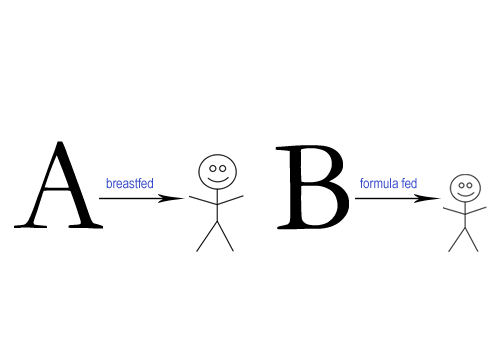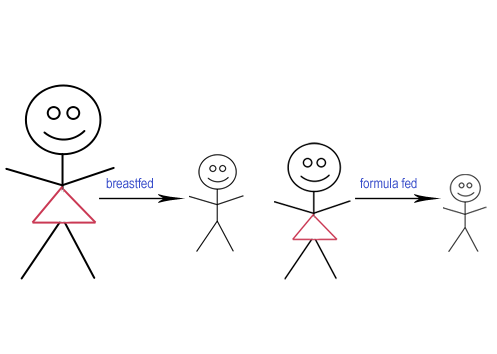Why aren’t breastfeeding advocates satisfied with the real, albeit small, benefits of breastfeeding? Why do they repeatedly publish pathetically poorly done studies that make irresponsible claims about the benefits of breastfeeding?
I don’t know the answers, but I’m becoming ever more disgusted with their insupportable attempts and the willingness of scientific journals to publish the crappy papers that result. Not one, but two, new papers on the benefits of breastfeeding are making headlines this week and both suffer from flaws that would doom a middle school science fair project.
The first paper is Breastfeeding and early white matter development: A cross-sectional study by Deoni, et al. published in the journal NeuroImage. The purported “findings” have been published by sanctimommies everywhere under titles such as Breastfed Babies Are Smarter But That Doesn’t Mean Formula-Fed Babies Are Dumb. There’s just one teensy, weensy problem. The authors didn’t show anything of the kind. Indeed, as far as I can determine, they didn’t show anything at all.
To understand why the their study is fatally flawed, imagine for a moment that I did a study comparing two groups of children to determine if breastfeeding increases children’s height. Imagine further that I found the children from Group A, which contains a high proportion of exclusively breastfed infants, turn out to be several inches taller at age 5 than the children from Group B, who never received breastmilk. I’ve included a sophisticated graphical representation below.
Would I be entitled to conclude that breastfeeding made the children in group A taller than the formula fed children in group B?
It might appear that way at first, but as students of statistics know, you must compare like with like. Are the mothers in group A the same as the mothers in group B? I’ve added more data to the sophisticated graphic representation.
Now we see that the mothers in group A are actually taller than the mothers in group B. We therefore CANNOT conclude that breastfeeding increased the height of the children. The more likely explanation is that the children in group A are taller than the children in group B because of genetic inheritance.
Deoni and al. committed that very mistake. They compared two group of children on a proxy measure of intelligence without ever comparing the intelligence of their mothers. The authors actually acknowledge:
While maternal IQ was not specifically measured, the combination of education and SES [socio-economic status] was believed to provide an adequate alternative.
But the education and socio-economic status of the mothers in group A was known to be higher than in group B. Hence any observed differences between breastfed and formula fed babies is most likely due to genetics and social advantages, NOT to breastfeeding.
That’s only the most egregious deficiency of the study. There are many more. The authors didn’t actually look at the intelligence of the children in the two groups; they looked at white matter development in the brain and implied that it is correlated with intelligence. There’s no proof that the two are correlated. Indeed there is no proof that white matter development is in any way related to intelligence let alone correlated with it.
So, in the end, the authors found nothing at all. The study is junk.
The second study, Cost Analysis of Maternal Disease Associated With Suboptimal Breastfeeding, is, amazingly, even more irresponsible than the first. Bartick et al. breathlessly conclude, with absolutely no basis in fact:
… [W]e estimate that current breastfeeding rates result in 4,981 excess cases of breast cancer, 53,847 cases of hypertension, and 13,946 cases of myocardial infarction compared with a cohort of 1.88 million U.S. women who optimally breastfed. Using a 3% discount rate, suboptimal breastfeeding incurs a total of $17.4 billion in cost to society resulting from premature death $733.7 million in direct costs, and $126.1 million indirect morbidity costs.
There is just one ginormous problem. There is NO EVIDENCE AT ALL that breastfeeding prevents maternal high blood pressure or maternal heart attacks. That means that out of nearly 73,000 purported lives saved, fully 93% are simply made up.
If there’s one thing we know about breastfeeding, it’s that women who breastfeed differ in important ways from women who don’t. Women who breastfeed tend to be wealthier, better educated, and thinner, among other things. There are studies that have investigated an association between breastfeeding and maternal cardiovascular health, and they’ve found that any observed differences disappear when the comparison groups are corrected for economic status, educational attainment and weight.
Bartick et al. acknowledge the tenuousness of their claim with this caveat:
If observed associations between breastfeeding duration and maternal health are causal …
There’s absolutely no reason to believe that breastfeeding affects maternal cardiac health and no mechanism has been proposed, let alone established. The idea that breastfeeding has a protective effect against the diseases of old age in affluent societies is absurd on its face. For most of human existence, women didn’t survive long enough to develop high blood pressure or have heart attacks.
This isn’t the first time that Bartick has published her own wishful thinking as if it were science. In The Burden of Suboptimal Breastfeeding in the United States: A Pediatric Cost Analysis published in 2010, Bartick used highly fanciful methods to “estimate” that the US could save 900 infant lives and $13 billion if 90% of US women breastfed. The numbers are grossly misleading since not even a single US infant death (let alone 900 per year) has ever been attributed to not breastfeeding and since the purported savings are primarily the “lost wages” of the 900 dead infants.
Who is Dr. Bartick? She’s an internist and fervent campaigner to ban formula gift bags in hospitals, an idea that is punitive (particularly to women of color and those of lower socio-economic status) and has never been shown to have any impact on breastfeeding rates. Dr. Bartick appeared in the comments section of this blog and revealed herself to be a bit of a crank, bemoaning the way that babies are mistreated in the first hour after birth:
Instead, babies [are] routinely whisked off and traumatized during that hour with baths, shots, eye ointments.
Baths, shots and eye ointment are traumatic? I suppose if you believe that, without any evidence of any kind, it’s not hard to believe that breastfeeding prevents the diseases of old age in affluent societies.
Both papers are emblematic of current breastfeeding “research,” which substitutes wishful thinking for scientific evidence.
If you told me that breastfeeding reduces the chance of infants developing malaria, I would find that plausible, since malaria has posed a serious threat to babies for thousands of years and anything that protect against it would be highly beneficial. That’s why the fact that breastfeeding is somewhat protective against infant diarrhea is hardly surprising since diarrhea is a killer in primitive societies. But the claims that breastfeeding addresses the obsessions of contemporary privileged societies (such as the emphasis on infant “intelligence” and diseases of old age) are extraordinary claims. Why would breastfeeding prevent diseases that rarely occurred until the last century? How can we possibly believe that breastfeeding increases intelligence when we have lived through several generations of virtually exclusive bottle feeding with no apparent change in brain power, technical innovation or academic achievements?
Extraordinary claims require extraordinary evidence. Instead we are treated to poorly done studies making bizarre claims based on wishful thinking. What’s next? I’ve got it: breastfeeding prevents global warming! That’s gonna really make a splash.




